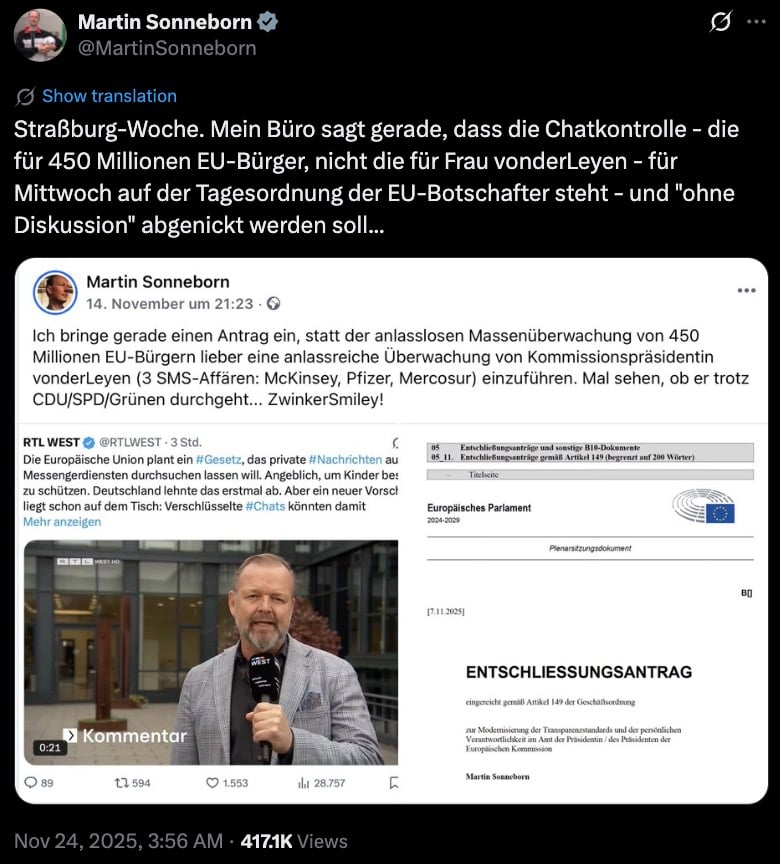Between the coffee breaks and the diplomatic niceties of Brussels bureaucracy, a quiet dystopian revolution might be taking place. On November 26, a roomful of unelected officials could nod through one of the most consequential surveillance laws in modern European history, without ever having to face the public.
The plan, politely titled EU Moves to End Private Messaging with Chat Control 2.0, sits on the agenda of the Committee of Permanent Representatives, or Coreper, a club of national ambassadors whose job is to prepare legislation for the European Council. This Wednesday, they may “prepare” it straight into existence.
According to MEP Martin Sonneborn, Coreper’s diplomats could be ready to endorse the European Commission’s digital surveillance project in secret.

It was already due for approval a week earlier before mysteriously vanishing from the schedule. Now it’s back, with privacy advocates watching like hawks who suspect the farmer’s got a shotgun.
The Commission calls Chat Control 2.0 a child-protection measure. The branding suggests moral urgency; the text suggests mass surveillance. The proposal would let governments compel messaging services such as WhatsApp or Signal to scan users’ messages before they’re sent.
Officials insist that the newest version removes mandatory scanning, which is a bit like saying a loaded gun is safer because you haven’t pulled the trigger yet.
A President’s Pet Project
Commission President Ursula von der Leyen has treated this initiative as a centerpiece of her digital policy, though “digital policy” increasingly looks like a euphemism for “monitoring architecture.”
Her plan would effectively turn private chat services into data-mining contractors for the state.
Sonneborn put it bluntly: the EU is on the verge of creating “a dedicated spying authority.” It’s hard to call that an exaggeration.
The European Commission, which has spent years refusing to release von der Leyen’s text messages about vaccine contracts, now wants the legal authority to inspect yours. Transparency, it seems, is a privilege reserved for the ruled.
Chat Control does not exist in a vacuum. It fits neatly beside the Digital Services Act, the digital identity proposals, and other innovations that make online behavior traceable from cradle to grave. Together they form a system where anonymity is a bug, not a feature.
The justification is the same every time: children. The issue is real; the logic is not. Dismantling encryption to catch predators is like removing everyone’s front doors to stop burglary. The real failures in child protection, including investigative neglect, resource shortages, and bureaucratic inertia, are too boring to legislate around, so instead, Europe aims to fix the problem by surveilling the population.
Germany once drew a line. Justice Minister Stefanie Hubig called scanning innocent chats “an absolute taboo in a constitutional state.” That was then. Sonneborn now warns that Berlin may be preparing to let the taboo quietly dissolve, a move that would clear the way for the rest of the Council to fall in line.
Once Germany folds, the rest of Europe will follow the usual pattern: moral speeches, procedural approval, and a quick December adoption while everyone’s distracted by holiday markets.
If Coreper signs off this Wednesday, the EU will have taken the first formal step toward making private digital communication a thing of the past. No open debate, no meaningful oversight, just a discreet, administrative erasure of privacy.
Future historians will not find a dramatic announcement for the day Europe normalized message scanning. They’ll find a line in a meeting summary, approved “without discussion.” And that, in Brussels, is what democracy now looks like.










